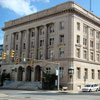Saving the places that matter most to people is an important part of building a vibrant community. The preservation and protection of the City’s historic buildings, structures, sites, and districts is a key consideration in any land use decision in the City of Charleston.
The Charleston Historic Landmarks Commission was established by City Council in 2007 to identify, study, preserve, and protect the City’s historic landscape. In doing so, the CHLC evaluates the City’s historic and cultural resources, advocates for preservation-based public policy, and works to educate the public on the benefits and challenges of historic preservation.
Click here to view a map of Charleston’s Historic Districts.
Charleston boasts 9 districts listed on the National Register of Historic Places:
- Downtown Historic District
- East End Historic District*
- East End Historic District Expansion
- Edgewood Historic District
- Elk City Historic District
- Grosscup Road Historic District
- Luna Park Historic District
- Spring Hill Cemetery Historic District
- Five Corners Historic District
*Only the properties located within the original East End Historic District are subject to a design review process conducted by the CHLC. Click here to review the guidelines governing this process.
Financial incentives like grant programs and tax credits are available to individuals and businesses owning properties that contribute to the historic character of these districts, provided that there is willingness to follow the Secretary of the Interior’s Standards for the Rehabilitation of Historic Structures and to work with the WV State Historic Preservation Office in doing so.
One additional historic district exists in the City, recognized locally for its significance in the history of the African American community in Charleston. The Block Historic District, located along US Route 60, was known to be a safe place for African Americans fleeing the South in search of the industrial jobs available in the North.
The CHLC and the City of Charleston believe that the benefits of historic preservation are many:
- provides an opportunity for financial incentives to be used in adaptive reuse and economic development
- aids in the revitalization of the City’s central business district and urban neighborhoods
- improves property values
- enhances the City’s historic attractions to tourists and visitors
- allows for the education of future generations regarding the rich cultural history of the City.
The CHLC is a participant in the WV State Historic Preservation Office’s Certified Local Government program, which provides opportunities for technical assistance and funding to conduct their work.




